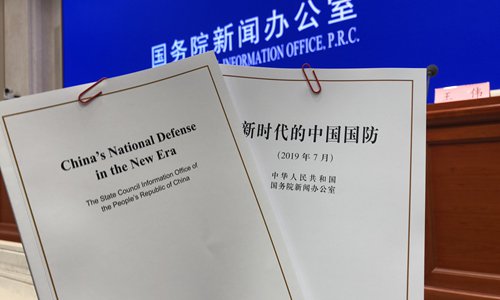HOME >> OPINION
Taiwan currying favor with US would only anger the Chinese mainland
By Xin Qiang Source:Global Times Published: 2019/8/1 20:23:39

Photo: Liu Xuanzun/GT
China issued on July 24 a white paper on national defense, China's National Defense in the New Era. On the same day, the US military said that it sent a navy warship through the Taiwan Straits, which is the sixth such voyage in 2019. Some media outlets regarded the US sail as a response to the white paper on national defense.
It cannot be ruled out that the US deliberately sent a warship through the straits on the day China's white paper was issued so as to flex military muscle. But it also might be a coincidence that the two events occurred on the same day. There is no need to overreact.
US warships have crossed the Taiwan Straits about once a month in 2019. The message it conveys, such as containing China and supporting the island of Taiwan, is nothing new.
Playing the Taiwan card has been a part of US policy toward China. Washington believes as long as it doesn't cross the red line of the one-China principle, Taiwan is the most effective card to provoke China without incurring a heavy cost.
The US would like to act as an outside balancer, which is to maximize its self-interest at a minimum cost by sowing discord among countries in a certain region. Currently, on the East China Sea and the South China Sea issues, Washington doesn't have many leverages and can hardly find countries willing to confront China.
Tokyo is easing ties with Beijing. The Philippines and Vietnam are unwilling to cooperate with the US to provoke China. Countries like Singapore have begun to gradually adjust their policies to strike a balance between China and the US.
However, the situation in Taiwan is different.
The Taiwan question concerns China's core interests. As cross-Straits ties have been strained, Taiwan's regional leader Tsai Ing-wen relies only on the US to confront the Chinese mainland, which has created space for the US to play tricks. Any trick played by the US would anger China. But the US believes that as long as it doesn't cross the red line, China will not resort to force or other drastic measures. Washington also believes that the Chinese mainland must take into consideration the sentiment of ordinary people on Taiwan island. If the Chinese mainland is too tough on Taiwan, it may in turn help Tsai to win reelection.
That being said, Washington is convinced that stirring up trouble on the Taiwan question is the best way to contain China. Supporting Taiwan authorities against the Chinese mainland through diverse means has been a US strategy. As long as US President Donald Trump is in office and Tsai's Democratic Progressive Party is ruling the island, Washington will continue to play the Taiwan card.
In comparison to China's white papers on national defense issued in 2013 and 2015, the latest one devotes more text to show the mainland's position toward the island of Taiwan, using harsher language.
This change is determined by the current situation of the Taiwan Straits and China-US ties.
In both 2013 and 2015, Ma Ying-jeou served as the regional leader of Taiwan. During his tenure, cross-Straits relations had been improving, with frequent interactions and cooperation across the straits.
The current situation is totally different. Tsai has been working with the US against the Chinese mainland, refusing reunification and pursuing Taiwan independence. In the 2020 Taiwan regional leadership election campaign, Tsai will definitely play the card of "Taiwan's sovereignty" and step up the strained cross-Straits relationship so as to gain more votes.
Now that both China-US relations and cross-Straits ties are regressing, observers predict they will deteriorate further.
The Chinese mainland's attitude toward Taiwan should thus not be the same as it was in 2013 and 2015. The Taiwan question is facing more urgent and graver challenges. By issuing the latest white paper on national defense, the Chinese mainland took a clear and firm stance toward Taiwan.
The author is deputy director of the Center for US Studies at Fudan University. opinion@globaltimes.com.cn
Posted in: VIEWPOINT